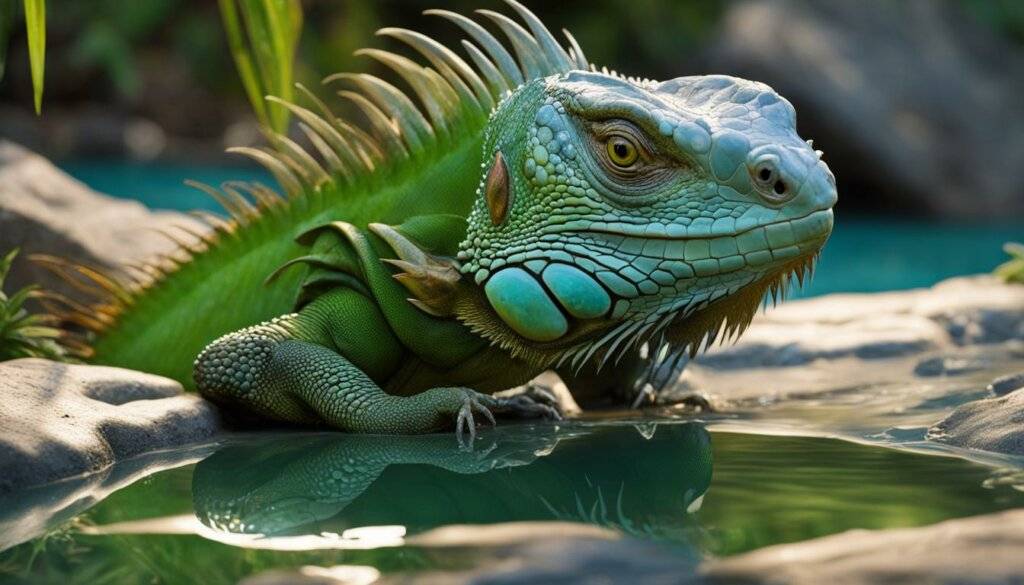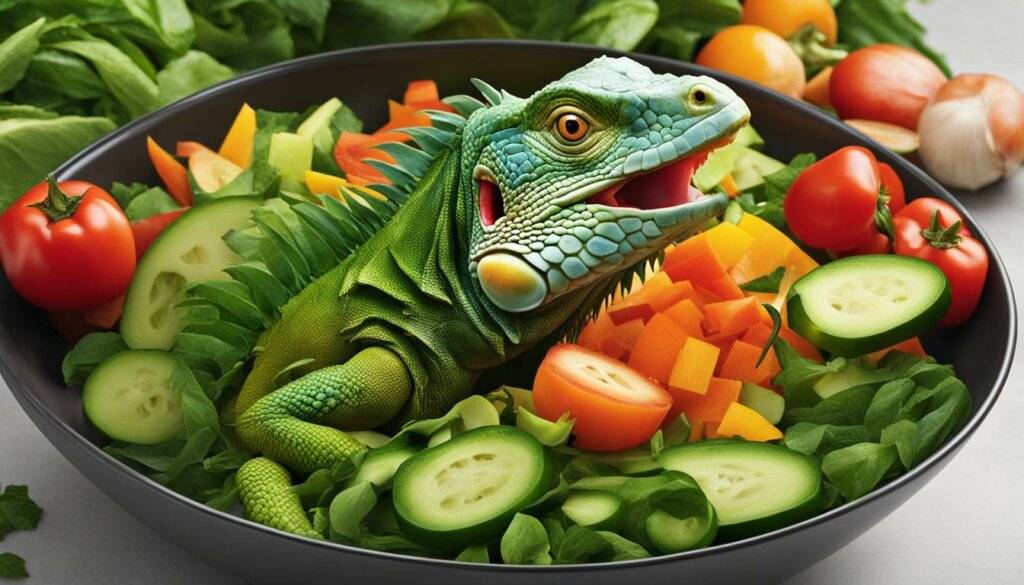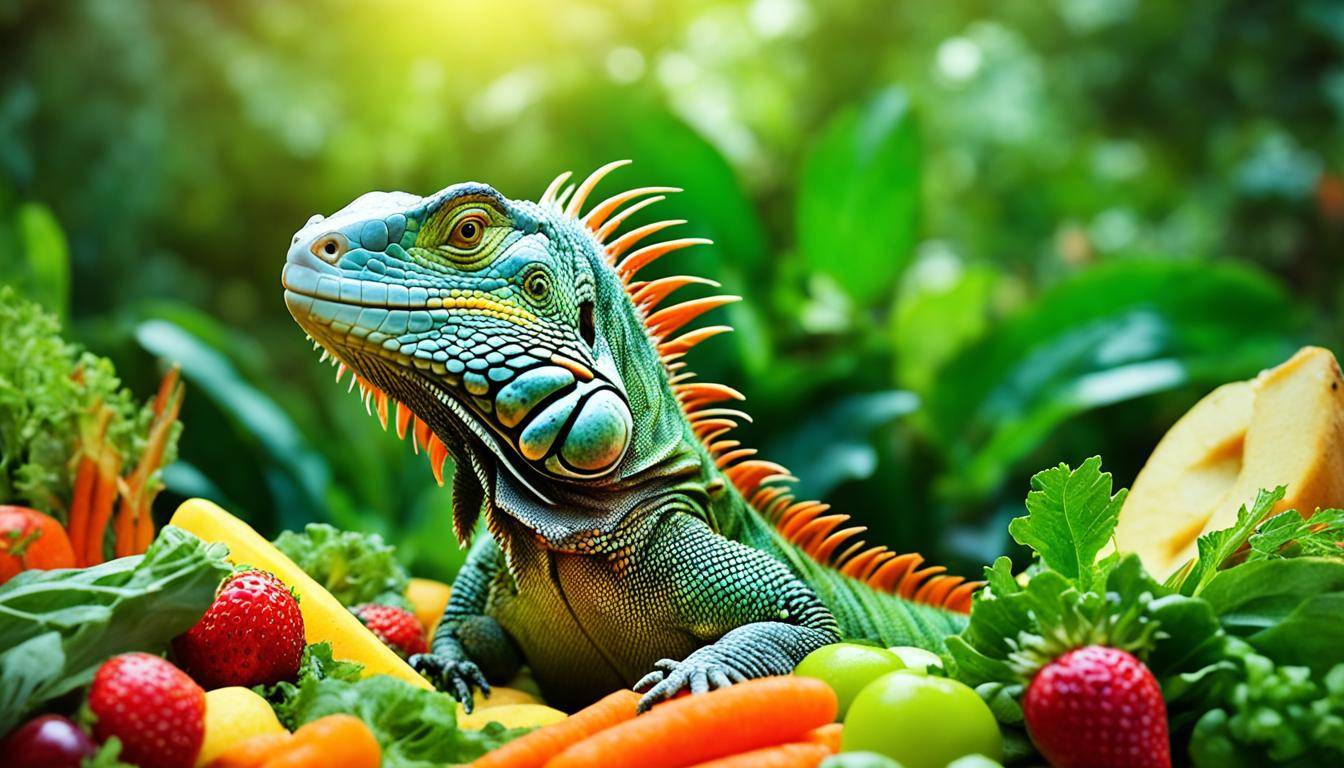Are you ready to explore iguana diets? I’ll show you what these cool reptiles eat to be happy and healthy.
Meet Lily, the bright green iguana. She loves the sun and her green home. Iguanas, like Lily, eat only plants. Their favorites are leaves, fruits, and flowers.
Lily sits on a branch and snacks on green leaves. In the wild, iguanas eat tree and vine leaves. They pick their meals with care. But, what about pet iguanas? What should they eat?
Let’s dive into what pet iguanas need. We’ll talk about which veggies are a must and good commercial foods. Discover how to feed your iguana right and keep them healthy.
Types of Plant Material for Iguanas
An iguana’s diet mainly includes dark green leafy veg, making up 80-90% of what they eat. Great choices are collard greens, beet greens, and kale. For variety, you can add cactus, broccoli, and bell peppers.
Less than 20% of an iguana’s diet should be fruits. This can be apples, pears, or strawberries. And don’t forget, tasty flowers like geraniums and dandelions can be a special treat.
Young iguanas may like lentils and navy beans. But only give them a little.
Don’t feed iguanas veggies like iceberg lettuce, they don’t offer much nutrition. Make sure their meals are balanced and diverse. This keeps them healthy.
Calcium and Vitamin Supplements for Iguanas
Iguanas need specific food to stay healthy. Calcium is vital for their bones and teeth. They also require vitamins for overall health. So, giving them supplements is key for their well-being.
Calcium Supplements for Iguanas
Healthy iguanas must have more calcium than phosphorus in their diet. Sprinkle a reptile calcium powder on your young iguana’s food every other day. This ensures they get enough calcium.
Adult iguanas have different diet needs. They need calcium sprinkled on their food once to twice weekly. This helps their bone health stay strong.
Vitamin Supplements for Iguanas
Iguanas also need vitamin D for their bones. Give a multivitamin twice weekly to young iguanas. It’s packed with vitamin D for their growing bones.
Adult iguanas need less vitamin D. They get it from a multivitamin twice a month for their health.
You should sprinkle these supplements on small bits of food. Feed them to your iguana first, mixed in meals. Always talk to a reptile vet for the right amounts of supplements for your iguana.
Water and Hydration for Iguanas
Iguanas need fresh, clean water to stay healthy. They should always have access to water. A heavy water bowl is a good choice to keep them from tipping it over. Remember to change the water and clean the bowl daily. Iguanas can make the water dirty when they bathe in it.
Iguanas also get water through their skin. In dry or cold places, misting your iguana with a water sprayer will help with hydration. This method lets them take in water through their skin.
Feeding iguanas organic produce, grown without pesticides, is best. It ensures they eat healthy food. A balanced diet keeps them hydrated and well.

-
Save
Make sure the water your iguana drinks is free from chemicals or toxins. Chemicals can harm them. Clean the water bowl often and use fresh water to avoid bacteria or algae.
Keep a close eye on your iguana’s water and hydration. Ensure they always have fresh water. Clean their bowl every day. Also, mist them several times weekly to help them stay hydrated.
| Water and Hydration Tips for Iguanas |
|---|
| Provide a heavy water bowl that cannot be easily tipped over |
| Change the water and clean the bowl daily |
| Mist your iguana with a water sprayer a few times a week |
| Use organic produce grown without pesticides for feeding |
| Ensure the water is free from chemicals or toxins |
Commercial Food Products for Iguanas
Feeding your pet iguana can be easy with the right products. Many foods are made just for them. They can be their main meal or a tasty addition to fresh fruits and veggies.
Always pick foods made for reptiles, not for cats, dogs, or rodents. Those other foods are too rich in protein and vitamins for iguanas.
These commercial foods are made to keep iguanas healthy. They have all the nutrients iguanas need. This makes feeding simple and nutritious.
Commercial foods are great because they can be moistened. This helps iguanas stay hydrated, especially in the heat. It’s also a sneaky way to give medicine.
Be sure to feed iguanas as directed on the food. This keeps their diet just right and their health in check.

-
Save
Benefits of Commercial Food for Iguanas
Using commercial food is great for iguanas. It helps in several ways:
- Convenience is a big plus. It’s easy to give your pet good food regularly.
- The food is designed just for iguanas. It ensures they get the right nutrients.
- Food can be made wet to keep iguanas hydrated. This is key in warm weather.
- It’s also good for giving medicines. This makes care simpler and less stressful.
Don’t forget, though, fresh fruits and veggies are essential too. They add important nutrients to your iguana’s diet.
Seek advice from a reptile-savvy vet on using commercial food. They’ll help choose the best food amounts and schedule for your iguana.
What Not to Feed Your Iguana
It’s key to give your iguana a wide diet but avoid some foods. These foods could hurt your iguana’s health. Being careful about what you feed them is crucial for their well-being.
Oxalate-Rich Foods
Foods like spinach and beet greens have oxalates. They can stop calcium from being absorbed. This could cause health problems for your iguana. Limit these foods to keep your pet healthy.
Goitrogenic Foods
Foods like kale and cabbage can mess with your iguana’s thyroid. This affects their metabolism. To avoid issues, limit these foods in their diet.
Foods with High Acidity
Fruits like oranges, lemons, and pineapples are too acidic for iguanas. They can harm the digestive system. It’s safer not to feed these fruits to your pet.
Unsafe Vegetables
Vegetables like iceberg lettuce and celery lack important nutrients. They should not be part of your iguana’s diet. Your iguana needs vitamins and minerals from better foods.
Choosing the right foods will keep your iguana healthy and help them live longer.
| Foods to Avoid | Reason |
|---|---|
| Spinach | High in oxalates, affects calcium absorption |
| Beet greens | High in oxalates, affects calcium absorption |
| Kale | Goitrogenic, interferes with thyroid function |
| Cabbage | Goitrogenic, interferes with thyroid function |
| Oranges | High acidity, can cause gastric or gastrointestinal issues |
| Lemons | High acidity, can cause gastric or gastrointestinal issues |
| Pineapples | High acidity, can cause gastric or gastrointestinal issues |
| Iceberg lettuce | Nutrient-deficient, lacks proper nutrition |
| Celery | Nutrient-deficient, lacks proper nutrition |
Always talk to a vet for advice on feeding your iguana. A balanced diet tailored to your iguana is best for their health.
Conclusion
Feeding your iguana right is key to keeping it healthy. Iguanas mainly eat things like dark green veggies, fruits, and flowers. They also need calcium and vitamins. A vet can tell you which supplements are best. There are foods made just for iguanas that can help, too.
Stay away from foods with lots of oxalates or goitrogens. These can stop them from getting key nutrients. By giving them the right food and making sure they drink enough, your iguana will be happy and healthy. Always ask a vet for diet tips specific to your iguana.
A good diet and care will help your iguana live a long time. Knowing what veggies to pick and adding the right vitamins is crucial. A varied diet and essential nutrients make your pet thrive. So, feed your iguana well and you’ll see them do great!
